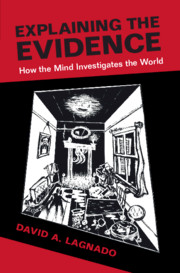‘This book is fun to read and easy to understand. It teaches us how we evaluate evidence and how we can evaluate it better. Ordinary people, without scientific training, on a jury or a city council or considering a big move to a new job can deploy these causal modelling techniques to manage evidence effectively.’
Nancy Cartwright - Professor of Philosophy, Durham University, UK
‘This is a remarkable achievement. Explaining the Evidence provides a wonderfully clear, entertaining and erudite introduction to one of humanity’s most important, yet unreliable, abilities: building explanations of the world, and the people, around us.’
Nick Chater - Professor of Behavioural Science, University of Warwick, UK
‘Entertainingly illustrated with examples of legal cases, Lagnado’s impressive book brings together insights from experimental psychology with modern tools for formal causal reasoning. We use causal stories to try to make sense of evidence, but these can all too easily mislead; this book should help us to overcome these cognitive biases.’
A. P. Dawid - Emeritus Professor of Statistics, University of Cambridge, UK
‘Using causal models and psychology, this work presents a systematic approach to modelling and evaluating evidence. The real criminal cases make for fascinating reading and help to ground the material. This book should be of interest to those in psychology, law and law enforcement, or those wanting to better understand and apply reasoning about evidence.’
Joseph Y. Halpern - Professor of Computer Science, Cornell University, USA
‘In this fascinating book, one of the world’s leading experts in causal cognition uses criminal cases and their legal context to show how people seek explanations of the evidence by building causal mental models of the world. So clearly articulated in this book, these ideas are at the forefront of current thinking in this area. It will be of inestimable value to undergraduate and postgraduate students and researchers alike. I also would highly recommend it to psychologists, legal scholars and computer scientists.’
Mike Oaksford - Professor of Psychology and Head of the Department of Psychological Sciences, Birkbeck College, UK
‘This book provides a flowing, compelling and lucid account of how computational models of mental states are changing the face of cognitive psychology and decision-making sciences. It is a must for students of mind, cognition, behavioural sciences and law, especially data scientists who labour to emulate human behaviour on digital machines.’
Judea Pearl - Professor of Computer Science, UCLA, USA
‘How people respond to evidence (and how they don’t) is one of the burning questions of our time. Yet one hardly expects a book on the psychology of evidence to be a page-turner. But that’s exactly what Dave Lagnado has produced in this authoritative text on the cognition of crime, investigation and verdict.’
Steven A. Sloman - Professor of Cognitive, Linguistic and Psychological Sciences, Brown University, USA
‘Explaining the Evidence is especially compelling reading for anyone involved in law. Through crime investigations, it explores our human capacity for reasoning and exposes the challenges in evaluating evidence that confront decision-makers in criminal cases. Most excitingly, it provides new tools that could ensure sounder judgments and prevent miscarriages of justice.’
Cheryl Thomas - Professor of Judicial Studies and Director of the Jury Project and Judicial Institute, UCL, UK
‘This very readable book will help to make evidence, as a subject, an important focus of cross-disciplinary attention.’
William Twining - Emeritus Quain Professor of Jurisprudence, UCL, UK
‘This book is a terrific read. It is engaging on every level. Using examples of reasoning about crimes, Lagnado skilfully applies theories from empirical psychology. The result is a highly readable introduction to statistical reasoning, Bayes nets representations of causal relationships, heuristically useful reasoning strategies and much more. I strongly recommend it.’
James F. Woodward - Distinguished Professor of History and Philosophy of Science, University of Pittsburgh, USA



